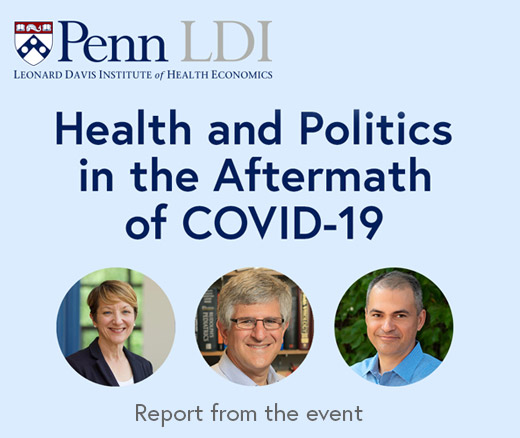
Contradictions That Confuse Federal Food Policies
Announcing Bold New Goals While Crippling the Infrastructure Needed to Achieve Them
Population Health
Blog Post
In 2015, an environmental policy group discovered a massive fraud by Volkswagen: A line of “clean diesel” cars including popular Beetle, Golf, and Jetta models were instead excessively dirty—producing up to 150 times the pollutant levels of gasoline-powered models. Penn LDI Senior Fellow Diane Alexander and Hannes Schwandt of Northwestern University) calculated the excess pollution from the scam and the impact on infant and child health.
The “cheating cars,” as they are called in Alexander and Schwandt’s paper in The Review of Economic Studies, were first sold in the U.S. in 2008. They were touted as an environmentally conscious choice and earned awards such as “Green Car of the Year.” Later investigations, however, found the cars’ software-activated emissions controls worked only under testing conditions. On the road, these controls were disabled and the cars generated high levels of particulate matter and gases that are known to worsen lung function, exacerbate asthma and heart disease, and create smog.
Alexander and Schwandt used the VW scandal as a natural experiment to study a research question that is usually difficult to answer: What is the effect of moderate levels of car pollution on population health? Previous research shows strong negative effects on disadvantaged groups such as people with lower incomes who live near pollution hotspots, but it is difficult to study the effect of pollution on those who are less exposed. The cheating cars were marketed to and purchased by higher-income consumers, allowing an analysis of car pollution effects on a broader population.
The study used data from 2007 to 2015 on vehicle registrations and air pollution from monitoring stations. Health effects were analyzed using county-level data on the birth weight, gestation length, and one-year mortality for all U.S. births, plus asthma emergency room visits for five states covering 228 counties.
The researchers found that adding just one cheating car per 1,000 cars was associated with a 1.3% to 2.2% increase in three types of pollution: ozone, the main component of smog, and two measures of particulate matter. The authors calculated that each additional cheating car per 1,000 cars led to approximately 10% more car exhaust. That level of higher pollution was linked to county-level increases of nearly 2% in low birth weight and more than 1.5% in infant mortality. Children’s asthma also worsened, with an 8% rise in children’s emergency room visits for asthma in the subsample of 5 states.
Effects were strongest for children of non-Hispanic white mothers with college degrees, likely because of greater exposure to cheating diesel cars. The VW marketing strategy for the cars stressed their “clean” technology, so the impact was greatest on people who could afford this option. Cheating cars were most common in areas with a reputation for relative wealth and environmental consciousness such as the West Coast, the Upper Midwest, and New England, and counties with those characteristics within those areas. The Alexander and Schwandt study found that health effects localized in the counties in which owners of cheating cars resided, without significant effects on neighboring counties. These findings bring home the health consequences of transportation choices and heavily polluting vehicles.
The study showed that car emissions had an impact regardless of whether an area had overall higher or lower pollution levels and harms occurred even at levels below the threshold of air pollution that is considered safe by the Environmental Protection Agency. These findings support strong measures to limit harmful emissions as much as possible. Alexander notes that the results support the Biden-Harris Administration’s recent announcement of infrastructure investments and rules to reduce polluting emissions from buses, port equipment, and heavy-duty vehicles. These measures and regulations alone are insufficient, though. VW blatantly cheated, showing that they must come with meaningful enforcement.
The study, “The Impact of Car Pollution on Infant and Child Health: Evidence from Emissions Cheating” was published in The Review of Economic Studies on February 16, 2022. Authors were Diane Alexander and Hannes Schwandt.

Announcing Bold New Goals While Crippling the Infrastructure Needed to Achieve Them

Promising New Evidence and What’s Next

From 1990 to 2019, Black Life Expectancy Rose Most in Major Metros and the Northeast—but Gains Stalled or Reversed in Rural Areas and the Midwest, Especially for Younger Adults

A Penn LDI Seminar Focuses on Why They’re Important for the Future

Former Philadelphia Health Commissioner Warns That Gutting the CDC, Undermining Vaccines, and Politicizing Science Will Leave the U.S. Dangerously Unprepared for the Next Pandemic

Rural Parents Had More Emergency Visits and Insurance Loss Than Urban Peers, an LDI Study Shows. Integrated Baby Visits Could Help All Parents Be Healthier

From Anxiety and Loneliness to Obesity and Gun Deaths, a Sweeping New Study Uncovers a Devastating Decline in the Health and Well-Being of U.S. Children
Before Lawmakers Do Full Legalization, We Must Face the Reality: High-Potency Marijuana Already Harms Kids and Adults Alike